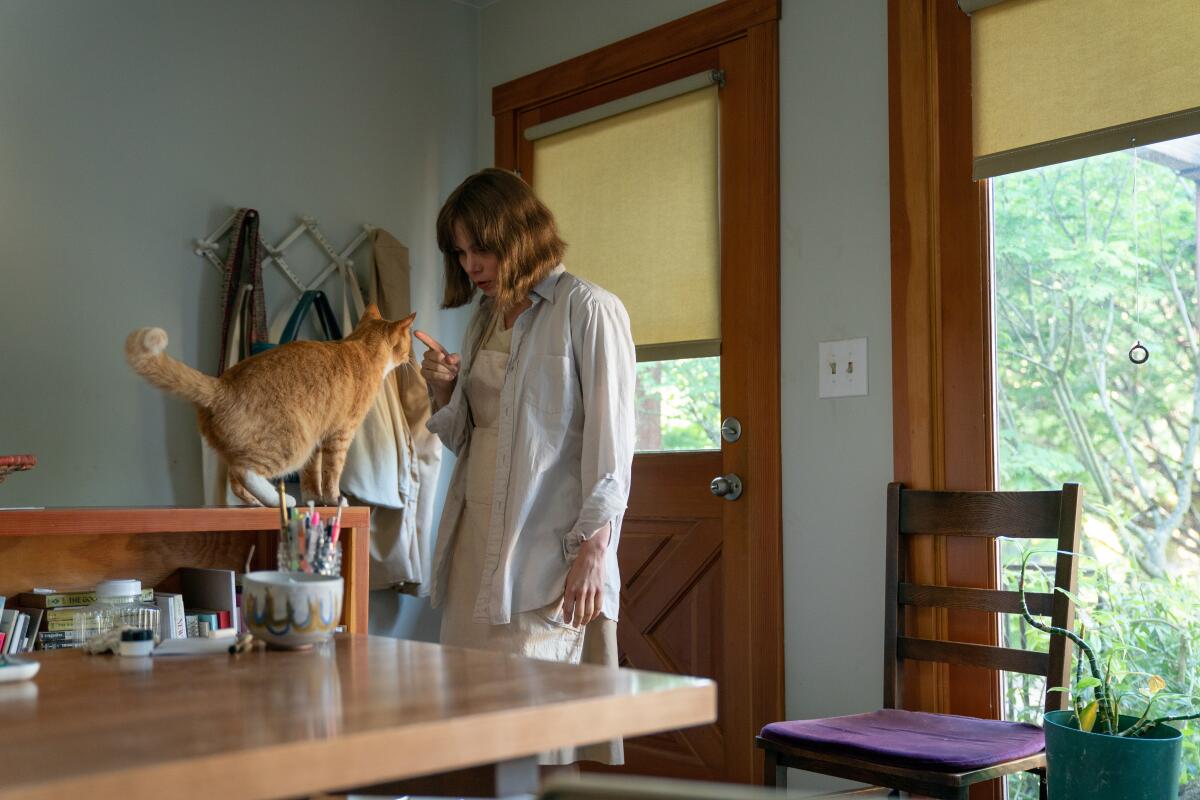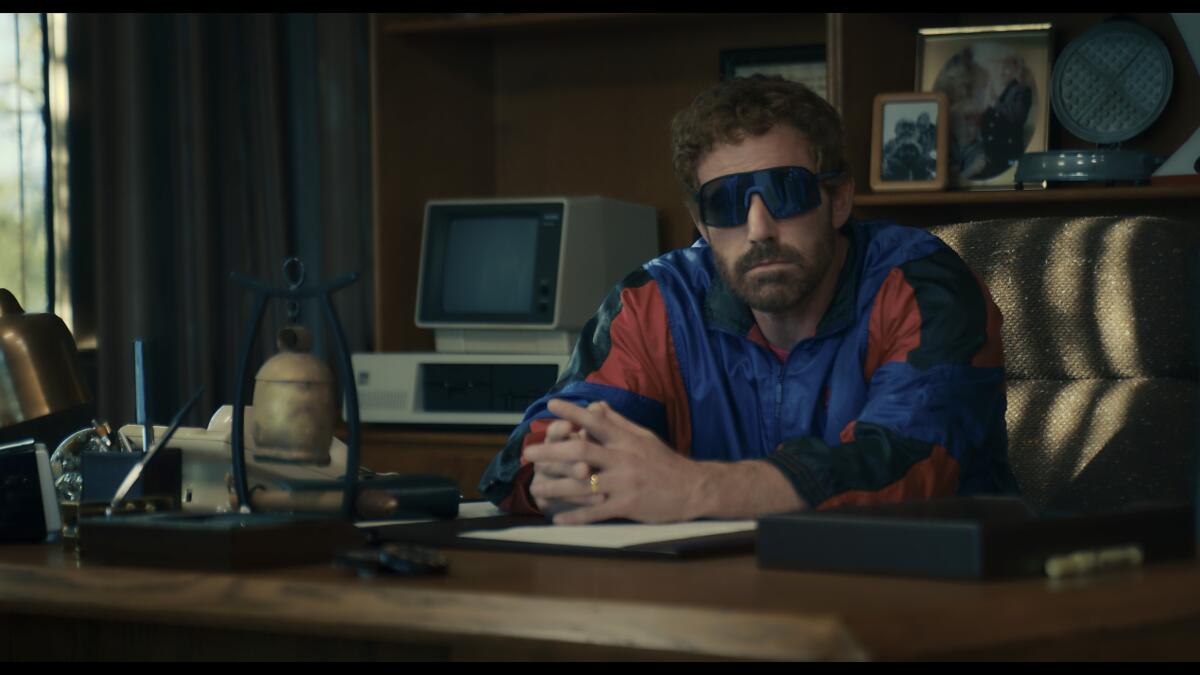Michelle Williams and Kelly Reichardt on the power of ‘Showing Up’

- Share via
Hello! I’m Mark Olsen. Welcome to another edition of your regular field guide to a world of Only Good Movies.
Only good movies
Get the Indie Focus newsletter, Mark Olsen's weekly guide to the world of cinema.
You may occasionally receive promotional content from the Los Angeles Times.
‘Drylongso’ restoration A snapshot of 1990s DIY independent filmmaking and a specific moment in Oakland, 1998’s “Drylongso” marked fine artist Cauleen Smith’s feature filmmaking debut. The story follows a female artist named Pica (Toby Smith) who forges a relationship with a young woman, Tobi (April Barnett), as the city is being terrorized by a serial killer, making the film a portrait of a time and place but also an examination of gender, violence, identity and friendship. A new 4K restoration of the movie, which won two Independent Spirit Awards, is playing in a limited engagement at the American Cinematheque April 9-14.
Louis Garrel as ‘The Innocent’ Louis Garrel has evolved from being a charming screen presence as an actor to a maker of equally charming films as a writer-director. His latest, “The Innocent,” which won French César Awards for Garrel’s screenplay and Noémie Merlant’s supporting performance, is now playing in Los Angeles. A sweetly offbeat mix of romantic comedy, family drama and caper flick, the film stars Garrel as Abel, whose mother, Sylvie (Anouk Grinberg), marries ex-con Michel (Roschdy Zem), sending Abel into a spiral, so he begins surveilling Michel with the help of his friend Clémence (Merlant).
Enjoying this newsletter? Consider subscribing to the Los Angeles Times
Your support helps us deliver the news that matters most. Become a subscriber.
‘Showing Up’
The fact that “Showing Up” is the new film directed by Kelly Reichardt, co-written with her frequent collaborator Jon Raymond, should be selling point enough. Reichardt is clearly one of the best filmmakers working in the world today, making films of quiet, unassuming power. The new movie is a gently knowing comedy about an artist named Lizzy (Michelle Williams) preparing for an exhibition of her work in Portland, Ore. The cast includes Hong Chau as fellow artist Jo, John Magaro, Judd Hirsch and André Benjamin. The film is in theaters now.
For The Times. Justin Chang called the film “wry and wonderful,” adding, “The decency and consideration that [Lizzy] tries to project into the world, and resents others for not showing her in return, go hand-in-hand with a pessimism about human nature that may be ungenerous but is not necessarily unearned. Reichardt, for her part, extends compassion in all directions, and crucially toward both sides of Lizzy and Jo’s difficult, passive-aggressive dynamic. … Could ‘showing up’ be read in the competitive sense, describing the sting that Lizzy must feel when Jo’s accomplishments overshadow her own? I prefer the more generous reading: It’s about who will turn out to be firmly on Lizzy’s side when all is said and done, and at the most anxious and fraught moment of her creative life. The answer surprises her as well as us, and it brings this wincingly funny, stealthily emotional movie to a conclusion that feels both casual and momentous. Sometimes being there makes all the difference. Sometimes showing up is enough.”
When the film premiered at last year’s Cannes Film Festival, Chang spoke to Reichardt about her career and ongoing collaborations. Michelle Williams reflected on their relationship — “Showing Up” is their fourth film together — noting, “After 14 years of friendship and collaboration, I think that what we have really built is trust. I trust her wishes and desires and she trusts me to deliver them to her. I would swim with alligators if Kelly asked me to.”
For the New York Times, Manohla Dargis wrote, “‘Showing Up’ is a portrait of an individual but the film is universal in the sense that it’s about a woman living in the concrete here and now. Reichardt is interested in abstract ideas and everyday intangibles, but her filmmaking is precisely grounded in the material world, and so is Lizzy. … Things happen in Reichardt’s movies — minor, fleeting and profound things, just like in life. Story can seem both too grand and too impoverished a word to describe the personal, richly inhabited and realistic worlds she creates from faces and bodies, poses and gestures, rituals and habits, and her very specific grasp on time and place. But of course there’s always a story in how human beings navigate one another and sometimes try to bridge — and hide out in — that bristling, ineffable space between us.”
For Vanity Fair, Richard Lawson wrote, “I’d have to imagine that ‘Showing Up’ is a deeply personal project for Reichardt, a mulling over of her own creative process just as last year’s exquisite ‘Bergman Island’ was for Mia Hansen-Løve. Williams, ever loyal to Reichardt, lends capable hands of support. She gives good prickliness — Lizzie is no saintly dreamer battered by a harsh world — but softens just when a real person might, when they realize that the indignant frustration probably isn’t worth it. Williams’s performance — nicely complemented by Chau’s not-quite-villainous blitheness — is about as natural as can be, fluid but purposeful as Lizzie makes her meandering way toward her big day.”
For the New Yorker, Richard Brody wrote, “There’s a special delight, as it relates to the critic’s daily activity, in the thrill of watching ‘Showing Up,’ as well as a lesson (one that I learned long ago): never write off a director. A lay viewer who has little enthusiasm for a director’s work to date may not rush off to see that filmmaker’s new release. A critic, of course, is professionally obligated to do so, and my unreserved pleasure in Reichardt’s new film is heightened by the sense of seeing a veteran filmmaker in a new light, of the revelation of a familiar artist’s formerly untapped resources of art and aspects of character. If I’ve been frustrated by Reichardt’s earlier films, it’s because they’ve been made with such artistic dedication and purpose, with such care for substance and texture, that their distinctiveness bypasses the ordinariness of good movies and aims at greatness. Reichardt’s evident artistic self-liberation adds an extra joy to the viewing experience.”

‘Air’
Directed by Ben Affleck from a screenplay credited to Alex Convery, “Air” tells the story behind the signing of a young Michael Jordan to Nike and the origins of the Air Jordan brand. Matt Damon plays Sonny Vaccaro, a talent scout for Nike; Viola Davis portrays Jordan’s mother, Deloris Jordan; and Affleck depicts Nike founder Phil Knight. The cast also includes Jason Bateman, Chris Tucker, Marlon Wayans, Chris Messina and Julius Tennon. The film is in theaters now.
For The Times, Justin Chang wrote, “Boasting a punchy, phone-slamming, expletive-hurling, heavily Aaron Sorkin-indebted script by Alex Convery, ‘Air’ is an ode to the art of the landmark celebrity-endorsement deal. It’s also something of a feature-length Nike commercial, albeit a deft and entertaining one. Mostly, it’s a tribute to classically American values like branding and publicity, ambition and swagger, wealth and more wealth (the Air Jordan line has earned billions and counting) and good, old-fashioned competitive cunning. … ‘Air’ almost convinces you that it’s more than just a feel-good celebration of capitalism and corporate power, that it has its eye not just on the prize but on the entire game — and that it’s looking out for all the underdogs as fervently as it wants you to believe.”
Greg Braxton spoke to Chris Tucker, who makes his first movie appearance in seven years as Howard White, eventual vice president of the Air Jordan brand. As Tucker said, “I’m a perfectionist. I get bored doing something just for the money. It’s not fun. I want to be all the way into something. I want to work with great writers and producers and scripts. It comes down to working with creative people who are willing to let you do your thing.”
For Vulture, Bilge Ebiri wrote, “‘Air’ might seem at first like a ridiculous idea for a movie, but it is in fact an ingenious one. The creation of the Air Jordan sneaker did change pop culture forever. … In truth, these men had enviable, high-ranking positions at major American companies. Deep down, however, they probably saw themselves as working stiffs just like everyone else, and the air of anonymous, workaday pathos Affleck conjures around them feels emotionally authentic. Like many corporate types, they are well-paid cogs. Their interaction with Michael Jordan brings them in touch with transcendence. Maybe that’s another reason why ‘Air’ doesn’t let us see the pretend Michael Jordan’s face. It needs the benediction offered by those pixelated, decades-old images of the real thing, whose presence still fills emotional voids and captures imaginations.”
For NPR, Aisha Harris wrote, “We’re living in the era of the nostalgic headline-to-Hollywood pipeline and in an age where entrepreneurs are obsessed with being credited as artistic visionaries, so perhaps it was inevitable something like the movie ‘Air’ would come to exist. Directed by Ben Affleck with a screenplay by Alex Convery, ‘Air’ is a soulless dramatization of how a giant corporation convinced a promising NBA rookie to make its already wealthy and well-off board members, CEOs, and salespeople even wealthier and set for life. OK, that’s the crass way of describing it; the film’s creators would undoubtedly characterize their aims as being more ‘inspiring’ than that. … But for all that Don Draperesque spin, ‘Air’ really is crass. It’s nothing more than a craven exercise in capitalist exaltation.”

‘How to Blow Up a Pipeline’
Directed by Daniel Goldhaber from a screenplay credited to Goldhaber, Jordan Sjol and Ariela Barer, “How to Blow Up a Pipeline” is a fictional adaptation of the nonfiction political manifesto of the same name by Andreas Malm. In the film, a group of young activists comes together to blow up an oil pipeline in Texas. The cast includes Barer, Sasha Lane, Forrest Goodluck, Lukas Gage, Kristine Froseth and Jayme Lawson. The film is in theaters now.
For The Times, Carlos Aguilar wrote, “Even if a tad contrived, the fact that each member of this ratpack clan represents a distinct background ensures that what unites them is not allegiance to a singular political or spiritual ideology, but rather the notion of a shared enemy: those willing to see the planet burn for a profit. Simultaneously rousing and unnerving, ‘Pipeline’ strays from despair. … When Xochitl aptly explains that ‘this is an act of self-defense,’ what she is so vehemently protecting is the chance at a collective future. Their fight then is just as much our fight.”
I spoke to Goldhaber, Barer and some of the cast, as well as Malm. On making a thrilling heist movie out of a radical political manifesto, Goldhaber said, “What matters is getting these ideas into the public consciousness and starting a debate on a universal level. … What does popular art look like? It looks like art that is financed and supported by the United States’ military-industrial complex, movies like ‘Top Gun: Maverick’ or Marvel films. When those are the dominant cultural narrative, it feels irresponsible to not try to compete with that, to spread a different kind of cultural idea.”
For the Playlist, Jourdain Searles wrote, “Goldhaber doesn’t shy away from interrogating his characters’ motives at every turn, maintaining the tenseness of the narrative. In a cinematic landscape that so often glorifies the military and police, ‘How to Blow Up a Pipeline’ puts a spotlight on true heroism, the kind that works against the oppressive arm of the state. In America, if the government supports your actions, you’re probably doing the wrong thing; but what’s legal is considered moral, and American cinema often takes that as unquestioned truth. Truly radical art interrogates the rigid parameters of government in search of more human truth, one that considers the possibility that people in power have very little understanding of what is good for the populace. Goldhaber approaches a statement like that here.”
For Rolling Stone, David Fear wrote, “[‘How to Blow Up a Pipeline’ is] also interested in exploring the line between expressing the language of the unheard in the name of progress (or survival) and the ‘unlawful’ use of violence for political aims. ‘Pipeline’ purposefully throws a sequence right in the middle of the movie that allows the ensemble to discuss whether what they’re doing makes them revolutionaries or criminals. The founding fathers and MLK are invoked. “Jesus was a terrorist!” cries Shawn, in a state of exaltation. Yes, the tone is somewhere between debate club and dorm-room sesh, but they’re still wondering where the lines are drawn, and why they keep getting blurrier even with the best intentions. … ‘How to Blow Up a Pipeline’ is a thriller, but it’s not just a thriller. It’s also aiming to be a Gen Z radicalization manifesto in the same spirit as the book, if not with the same rigor. I don’t ever see the Pentagon showing this to its employees. But I definitely see this playing on a lot of college campuses and provoking a lot of nodding heads.”

Only good movies
Get the Indie Focus newsletter, Mark Olsen's weekly guide to the world of cinema.
You may occasionally receive promotional content from the Los Angeles Times.




